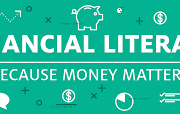There’s an epidemic happening right now—one that isn’t caused by a virus but is just as dangerous. It’s called financial instability, and it’s affecting millions of people across the country. It keeps hardworking individuals in cycles of stress, debt, and missed opportunities. And like any illness, if left untreated, the symptoms only get worse.
When is the last time you had a financial wellness check-up? You go to the doctor for your physical health, but what about your financial health? Many people suffer from money-related stress without even realizing the root cause of their issues. Do any of these symptoms sound familiar?
Common Financial Health Symptoms
“Falling Credit Score Fever” – Every time you check, your score has dropped again! “Denied Again Disorder” – Loan, mortgage, or apartment applications keep getting rejected. “Living Paycheck Paralysis” – No savings, no cushion, just barely surviving each month. “The Debt Hamster Wheel” – You make payments, but your balances never budge. “Late Fee Flu” – Late payments cost you hundreds, and the cycle never ends. “Financial Stress Headaches” – Losing sleep over bills and debt collectors. “Cash Flow Blockage” – Every dollar that comes in is already gone before you can use it.
Well, if you’re experiencing any of these conditions, your financial health is at risk—but the good news is, you can do something about it.
The Cost of Financial Stress
Money problems don’t just affect your bank account—they impact your mental health, relationships, and overall quality of life. According to the American Psychological Association, 72% of Americans report feeling stressed about money. Financial stress has been linked to:
· Higher rates of anxiety and depression
· Strained family and marital relationships
· Poor physical health due to stress-related illnesses
· Limited job opportunities because of credit issues
· A lack of generational wealth and financial security for families
Meanwhile, those who are financially literate and proactive about managing their money experience more peace, better opportunities, and long-term security. The difference? Knowledge and action taken.
Breaking the Cycle: Your Financial Wellness Plan
Most people never learned about money, credit, or wealth-building at home or school. Instead, they were handed bad financial habits from their environment—habits that keep them stuck in cycles of debt and struggle. But just like you can improve your physical health with the right habits, you can transform your financial health by making small, intentional changes one step at a time.
Money Tip: Every time you get paid, immediately set aside $10 (or more if you can) into a separate account. Make it automatic. Treat it like a bill you MUST pay—to your future self. Start small, be consistent, and watch your seed grow.
Why Most People Stay Financially Stuck
There is big business in keeping people financially sick. Banks make billions off overdraft fees and high-interest loans. Companies profit when consumers live paycheck to paycheck, relying on credit cards and debt to survive. Some lenders don’t want you to know how to fix your credit or leverage your money, because financially healthy people are less profitable for them.
But that’s what makes financial literacy so powerful. When you take control of your financial health, you shift from struggling to thriving. You gain the ability to buy homes, invest, and create generational wealth.
Financial wellness should be accessible to everyone. Working with a financial coach can help you structure your finances for long-term success. Additionally, they can help you shift from being financially powerless to financially empowered through credit education, financial coaching, and money mindset shifts.
Time for Your Check-Up
If your finances were a medical condition, would you ignore them? Probably not. You’d seek help, get a diagnosis, and take action.
Your financial health is just as important. Take the first step today:
1. Check your credit score.
2. Identify your biggest financial challenges.
3. Make a plan to improve your financial habits by signing up for a course.
If you don’t know where to start, you don’t have to do it alone. Help is available. Financial wellness isn’t just for the wealthy—it’s for anyone willing to take control and make a change.
Are you ready to take your financial health seriously? It’s time to stop surviving and start thriving!
About the Author: Rachel Wallace, founder of EMPOW8R and financial coach, whose dedicated to helping individuals break free from financial stress through financial literacy. Learn more at www.EMPOW8R.com.

































